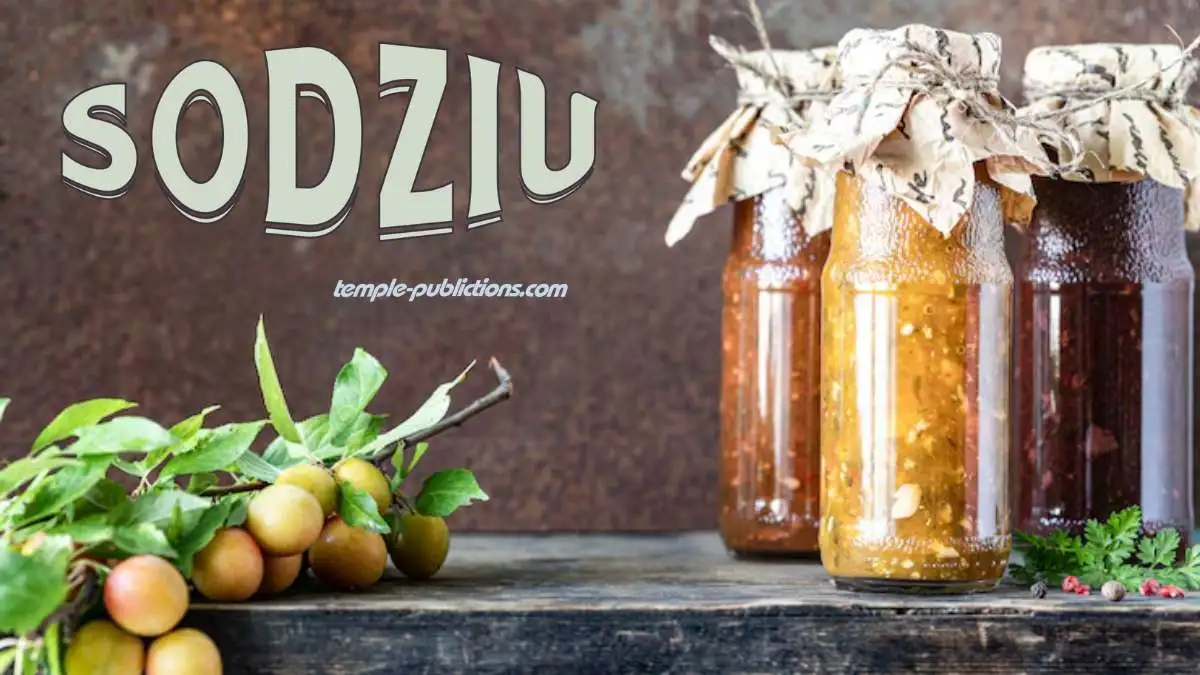FOODS AND DRINKS
Sodziu: Farm-Fresh Dining Experience Rooted in Sustainability

Farm-to-table dining has evolved beyond a trend—it is now a movement reshaping how communities relate to food, health, and the environment. At the heart of this transformation is Sodziu, a vibrant community that seamlessly blends sustainable farming with culinary innovation. By fostering direct connections between farmers and diners, Sodziu redefines what it means to eat fresh, local, and responsibly sourced food. This article explores how Sodziu’s model not only enhances the dining experience but also supports local ecosystems and economies.
What is Sodziu?
Sodziu transitions farm-to-table in a new way by including eco-friendly farming, sourcing seasonal and local products, and inventive cooking that focuses on regional tastes. Community partnership, honest action, and caring for the earth guide its approach, resulting in a memorable dinner with lessons. Their organic land is important, but at Sodziu, it also affects how the kitchen operates day in and day out. As a result, every bite supports farmers in the area, lessens damage to the environment, and values traditions, raising the standard for eco-friendly dining.
The Core Philosophy Behind Sodziu’s Farm-to-Table Model
- Emphasis on organic, regenerative farming and biodiversity
- Prioritizing local and seasonal ingredients to maximize freshness
- Transparency about food origins to build consumer trust
- Strong partnerships with regional farmers and artisans
Sodziu believes strongly that food should benefit both people and the earth. They cultivate organically, using healthy soil and many types of crops to make farming both better for the environment and healthier for food. What’s on the menu depends on seasonal produce, so guests enjoy dishes with fresh, peak-quality fruits and vegetables. Having an open door for people to visit the farm and join workshops helps consumers understand the process of bringing seeds to dinner.
Sustainable Farming Practices That Shape Sodziu’s Identity
- Use of composting, cover cropping, and crop rotation
- Water conservation through drip irrigation and rainwater harvesting
- Avoidance of synthetic pesticides and fertilizers
- Promotion of pollinator habitats and wildlife-friendly spaces
They pay close attention to sustainability when farming at Sodziu. By cover cropping, nutrients are naturally restored, and drip irrigation is a way to save water. Banning artificial chemicals on the farm saves local wildlife and results in healthier produce. When we make pollinators’ habitats, we support the right balance in ecology, which helps both our crops and nearby wildlife. Using these techniques supports the farm’s future and makes it more environmentally friendly.
Culinary Innovation at Sodziu: Merging Tradition and Creativity
Each season, chefs at Sodziu use local ingredients to make creative menus that highlight the best food the region offers. Recipes are updated by using only the freshest products bought each day from both the farmers’ market and the farm. Because farmers and chefs combine forces, meals are inspired and share the story of the land and those who live there. Eating quality whole foods is Sodziu’s way to encourage healthier eating and improve the way diners experience farm-grown meals.
The Dining Experience: More Than Just a Meal
Entering Sodziu’s restaurant is a bit like taking part in a celebration of both nature and culture. Every meal feels special thanks to rustic decorations, gentle lighting, and lively talk. Everyone providing service knows the backgrounds of all the dishes and seeks to match guests’ meals for added taste and experience. Providing vegan and gluten-free meals helps all guests to be included. Here, eating out is a unique experience that directly links customers to the environment and customs of the area.
Supporting Local Farmers and Communities
- Fair pricing and direct purchase agreements with growers
- Educational programs and farm tours for visitors
- Sponsorship of local food festivals and cultural events
- Creating jobs and sustaining rural economies
Sodziu takes buying local from farmers further than just selecting ingredients. Sodziu makes sure farmers get what they deserve and helps promote environmentally friendly farming. In addition, these partnerships include community events that teach residents how to cook and farm in an environmentally friendly way. Local festivals, along with sponsorship, help maintain dining culture, attract travelers, and increase community pride. It helps the community recover from economic problems and become united.
Environmental Stewardship: Minimizing Impact While Maximizing Flavor
Growing its food and generating the majority of its energy through solar panels helps Sodziu cut down its impact on the environment. Waste management means sorting compostable food and reducing items that are made from plastic. A rainwater harvesting system is an effective means of supplying water for irrigation. As a result, we have shown that it is possible to work sustainably without sacrificing quality.
Challenges in Maintaining a True Farm-to-Table Model
It is very difficult to run a restaurant where food is grown and served using only sustainable practices. Often, having to change the menu leads to ongoing changes in inventory. Since organic items are more costly, companies must help consumers learn how sustainability affects their food. Problems arising from climate fluctuations and interruptions to the supply chain create risks as well. Yet, thanks to Sodziu’s openness and support from the community, these hurdles are overcome, and the project can prosper for years ahead.
Comparing Key Elements of Traditional vs. Sodziu’s Farm-to-Table Approach
| Element | Traditional Farm-to-Table | Sodziu’s Farm-to-Table Model |
| Farming Practices | Basic local sourcing | Regenerative organic farming |
| Ingredient Sourcing | Seasonal but limited transparency | Seasonal, local, full traceability |
| Culinary Approach | Emphasis on fresh produce | Fusion of tradition and innovation |
| Community Engagement | Occasional collaborations | Deep partnerships & education |
| Environmental Commitment | Varies widely | Strong focus on renewable energy, waste reduction |
| Menu Flexibility | Seasonal with some limitations | Dynamic, constantly evolving menus |
The Ripple Effect: How Sodziu Influences the Broader Culinary World
Because of his achievements, other eateries are deciding to use sustainable methods, pushing the industry to improve. Because of its clear farm-to-table method, customers discover more about where their food comes from and learn why ethical eating is preferred. What happened here serves as an example in culinary schools and among food policy experts promoting sustainable practices.
Conclusion
Sodziu reflects the next stage of farm-to-table dining by combining care for the environment, local traditions, and great food. Farm-to-table dining gets people to think about what they eat, helps their community, and benefits the environment. By shopping at Sodziu, people are helping to create a food system that respects what is good for the planet and the taste of our meals.
-

 BIOGRAPHY8 months ago
BIOGRAPHY8 months agoBehind the Scenes with Sandra Orlow: An Exclusive Interview
-

 HOME1 year ago
HOME1 year agoDiscovering Insights: A Deep Dive into the //vital-mag.net blog
-

 HOME1 year ago
HOME1 year agoSifangds in Action: Real-Life Applications and Success Stories
-

 BIOGRAPHY1 year ago
BIOGRAPHY1 year agoThe Woman Behind the Comedian: Meet Andrew Santino Wife




























